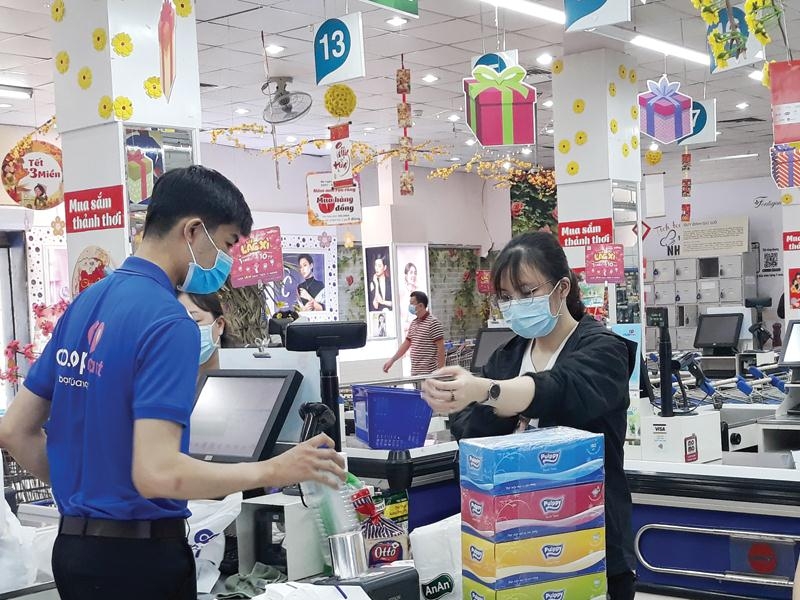FMCG groups made aware of trends
 |
| illustration photo |
Diana Unicharm JSC last week said that its distributors in Ho Chi Minh City and some southern provinces have found it too complex to transport various sanitary products to retail stores in the same city or province, because these items have not been classified as essential goods in some localities.
Diana Unicharm is one of the leading manufacturers in personal hygiene products in Vietnam possessing well-known brands including Diana sanitary napkins, Bobby diapers, and E’mos tissue brand.
If the blockages in the supply chain are not removed, the products will soon be in short supply in the market, affecting health and hygiene, warned the company.
Ho Chi Minh City and other southern provinces only allow trucks with essential goods to travel during the social distancing period under Directive No.16/CT-TTg released in March 2020 on measures for preventing and controlling COVID-19. However, due to the differences in classifying essential products among localities, some fast-moving consumer goods (FMCG) manufacturers are facing difficulties to move products within the southern region.
In some provinces, milk and other drinks were considered non-essential, making it hard for businesses to deliver certain products to retailers.
Last week, the Ministry of Industry and Trade proposed the government to issue a list of goods “prohibited from circulation” instead of a list of “essential goods”. This proposal aims to remove issues for businesses in transporting essential goods at this time. Like other manufacturing industries, FMCG groups are required to maintain a COVID-19 bubble or the three-on-spot plan for its workers to live, eat, and work at factories. This has put more pressure on these businesses to maintain manufacturing activities and supply products to end-users.
Processed food producer Vissan announced last week that it would cease operations. The company has detected coronavirus infection cases among its workers although it had established a COVID-19 bubble on site. Vissan is responsible for nearly 29 per cent of the goods supplied to Ho Chi Minh City during the social distancing period. Retailers are sourcing products from other suppliers to make compensation for the shortage from Vissan.
The disruptions among FMCG manufacturers are likely to cause price hikes. As reported by Wall Street Journal, Unilever was grappling with higher costs for ingredients, packaging, and transportation, which would likely lower its full-year profitability. Thus, the London-listed consumer goods giant said it would step up price increases across the world, having already raised prices 1.6 per cent in the second quarter. Other producers, including Procter & Gamble, have also warned of rising prices this year.
In the second quarter, Kantar Worldpanel Vietnam’s report showed that the increase of average paid price for FMCG (+2-3 per cent) is higher than the previous quarter and the average consumer price index (+1.5 per cent). However it is still lower than the same period last year. Given the worsening COVID-19 situation with an all-time high number of confirmed cases in July, the report said rising prices are inevitable as raw material costs increase due to stricter lockdowns. This is more likely to elevate further in the next two months.
According to Peter Christou, commercial director of Kantar Worldpanel Vietnam, because of price increases of ingredients, logistics, transportation, and others, producers cannot maintain current prices and may need to pass on price increases to consumers.
“They are concerned that if they increase prices, retailers and consumers will have negative reactions and cut back on their products or stop buying altogether. They need to understand the price elasticity – at which point consumers are willing to pay more for a given product by different consumer groups in order to manage the risk,” Christou said. “This time, the impact is more severe, with more cases and tougher lockdowns, and therefore the impact on household finances and job security is greater because it impacts people’s ability to go to work and do business, and therefore get paid.”
According to Kantar’s latest survey on consumer confidence in June, up to 40 per cent of households in the country’s biggest cities are struggling. The lower-income groups are even more affected with half of them facing financial restraint. There will be a spending cut on luxury and less essential categories and a downtrend in many other categories.
In terms of shopping behaviours, consumers started to stock up essentials such as packaged foods at the end of May, but not at a level seen in 2020’s first wave of coronavirus infections. Kantar’s data showed that the share of minimarkets has grown to almost the same level as hypermarkets and supermarkets in June. With new and even tighter restrictions together with a more severe impact on people’s income, there will be changes in consumers’ daily routines, with potential new behaviours emerging in the long term. Thus, FMCG producers will have to monitor the changes to adjust their strategy during the pandemic, the survey concluded.
What the stars mean:
★ Poor ★ ★ Promising ★★★ Good ★★★★ Very good ★★★★★ Exceptional
 Tag:
Tag:
Related Contents
Latest News
More News
- Spring Fair 2026 boosts domestic demand (March 02, 2026 | 16:30)
- Law on Investment takes effect (March 02, 2026 | 16:21)
- Ho Chi Minh City attracts nearly $980 million in FDI in early 2026 (March 02, 2026 | 10:57)
- Businesses bouncing back after turbulent year (February 27, 2026 | 16:42)
- VinaCapital launches Vietnam's first two strategic-beta ETFs (February 26, 2026 | 09:00)
- PM sets five key tasks to accelerate sci-tech development (February 26, 2026 | 08:00)
- PM outlines new tasks for healthcare sector (February 25, 2026 | 16:00)
- Citi report finds global trade transformed by tariffs and AI (February 25, 2026 | 10:49)
- Vietnam sets ambitious dairy growth targets (February 24, 2026 | 18:00)
- Vietnam, New Zealand seek level-up in ties (February 19, 2026 | 18:06)






















 Mobile Version
Mobile Version